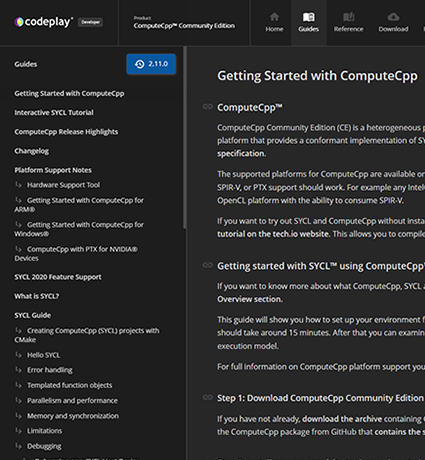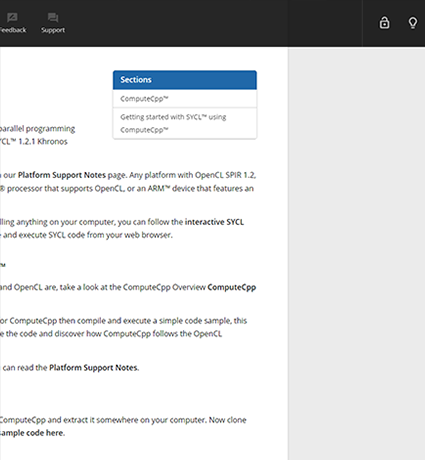This section covers troubleshooting tips and solutions to common issues. If the following doesn’t fix your problem, please submit a support request via Codeplay’s community support website. We cannot provide any guarantees of support, but we will try to help. Please ensure that you are using the most recent stable release of the software before submitting a support request.
Bugs, performance, and feature requests can be reported via the oneAPI DPC++ compiler open-source repository.
Missing Devices in sycl-ls Output
If sycl-ls does not list the expected devices within the system:
Check that there is a compatible version of the CUDA® or ROCm™ SDK installed on the system (for CUDA or HIP plugins respectively), as well as the compatible drivers.
Check that
nvidia-smiorrocm-smican correctly identify the devices.Check that the plugins are correctly loaded. This can be done by setting the environment variable
SYCL_PI_TRACEto1and runningsycl-lsagain. For example:SYCL_PI_TRACE=1 sycl-lsYou should see output similar to the following:
SYCL_PI_TRACE[basic]: Plugin found and successfully loaded: libpi_opencl.so [ PluginVersion: 11.15.1 ] SYCL_PI_TRACE[basic]: Plugin found and successfully loaded: libpi_level_zero.so [ PluginVersion: 11.15.1 ] SYCL_PI_TRACE[basic]: Plugin found and successfully loaded: libpi_cuda.so [ PluginVersion: 11.15.1 ] [ext_oneapi_cuda:gpu:0] NVIDIA CUDA BACKEND, NVIDIA A100-PCIE-40GB 0.0 [CUDA 11.7]If the plugin you’ve installed doesn’t show up in the
sycl-lsoutput, you can run it again withSYCL_PI_TRACEthis time set to-1to see more details of the error:SYCL_PI_TRACE=-1 sycl-lsWithin the output, which can be quite large, you may see errors like the following:
SYCL_PI_TRACE[-1]: dlopen(/opt/intel/oneapi/compiler/2024.1.0/linux/lib/libpi_hip.so) failed with <libamdhip64.so.4: cannot open shared object file: No such file or directory> SYCL_PI_TRACE[all]: Check if plugin is present. Failed to load plugin: libpi_hip.so
The CUDA plugin requires
libcuda.soandlibcupti.sofrom the CUDA SDK.The HIP plugin requires
libamdhip64.sofrom ROCm.
Double-check your CUDA or ROCm installation and make sure that the environment is set up properly i.e.
LD_LIBRARY_PATHpoints to the correct locations to find the above libraries.Check that there isn’t any device filtering environment variable set such as
ONEAPI_DEVICE_SELECTOR(note thatsycl-lswill warn if this one is set), orSYCL_DEVICE_ALLOWLIST.Check permissions. On POSIX access to accelerator devices is typically gated on being a member of the proper groups. For example, on Ubuntu Linux GPU access may require membership of the
videoandrendergroups, but this can vary depending on your configuration.
Dealing with Invalid Binary Errors
Incorrect Platform
A common mistake is to execute a SYCL program using a platform for which
the SYCL program does not have a compatible binary. For example the SYCL
program may have been compiled for a SPIR-V backend but then executed on a
HIP device. In such a case the following error code,
PI_ERROR_INVALID_BINARY, will be thrown. In this scenario, check
the following points:
Make sure your target platform is in
-fsycl-targetsso that the program will be compiled for the required platform(s).Make sure that the program is using a SYCL platform or device selector that is compatible with the platforms for which the executable was compiled. Try running with the environment variable
SYCL_PI_TRACE=1to print which device is being selected at runtime.
Correct Platform, Incorrect Device
When running SYCL™ applications targeting CUDA or HIP, under certain
circumstances the application may fail and report an error about an
invalid binary. For example, for CUDA it may report
CUDA_ERROR_NO_BINARY_FOR_GPU.
This means that the SYCL device selected was provided with a binary for the correct platform but an incorrect architecture. In that scenario, check the following points:
Make sure your target is in -fsycl-targets and that the correct architecture matching the available hardware is specified with the flags:
Flags for CUDA:
-Xsycl-target-backend=nvptx64-nvidia-cuda --cuda-gpu-arch=<arch>Flags for HIP:
-Xsycl-target-backend=amdgcn-amd-amdhsa --offload-arch=<arch>
Ensure that the correct SYCL device (matching the architecture that the application was built for) is selected at run-time. The environment variable
SYCL_PI_TRACE=1can be used to display more information on which device was selected, for example:SYCL_PI_TRACE[basic]: Plugin found and successfully loaded: libpi_opencl.so [ PluginVersion: 11.16.1 ] SYCL_PI_TRACE[basic]: Plugin found and successfully loaded: libpi_level_zero.so [ PluginVersion: 11.16.1 ] SYCL_PI_TRACE[basic]: Plugin found and successfully loaded: libpi_cuda.so [ PluginVersion: 11.16.1 ] SYCL_PI_TRACE[all]: Requested device_type: info::device_type::automatic SYCL_PI_TRACE[all]: Requested device_type: info::device_type::automatic SYCL_PI_TRACE[all]: Selected device: -> final score = 1500 SYCL_PI_TRACE[all]: platform: NVIDIA CUDA BACKEND SYCL_PI_TRACE[all]: device: NVIDIA GeForce GTX 1050 TiIf an incorrect device is selected, the environment variable
ONEAPI_DEVICE_SELECTORmay be used to help the SYCL device selector pick the correct one - see the Environment Variables section of the Intel® oneAPI DPC++/C++ Compiler documentation.
Unresolved extern function ‘…’ / Undefined external symbol ‘…’
This may be caused by a number of things.
There is currently no support for
std::complexin DPC++. Please usesycl::complexinstead.
Some C++ standard library math functionality declared in <cmath> (such as
std::cos,logf, sinf``) is not supported in kernel code for the AMDGPU backend of DPC++. Please use the equivalentsyclnamespaced versions instead.See Install oneAPI for AMD GPUs (beta) for more information.
Sub-group size issues in codes ported across platforms/architectures
Consider code that uses the kernel attribute reqd_sub_group_size to set a
specific sub-group size that is then ported to a different platform or executed
on a different architecture to the one it was originally written for. In such a
case if the requested sub-group size is not supported by the platform/architecture
then a runtime error will be thrown:
Sub-group size x is not supported on the device
On the CUDA platform only a single sub-group size is supported, hence only a warning is given:
CUDA requires sub_group size 32
and the runtime will use the sub-group size of 32 instead of the requested
sub-group size. The reqd_sub_group_size kernel attribute is designed for
platforms/architectures that support multiple sub-group sizes. Note that some
SYCL code is not portable across different sub-group sizes. For example,
the result of the sub-group collective reduce_over_group will depend on the
sub-group size. Users that want to write code that is portable across
platforms/architectures which use different sub-group sizes should either:
Write code in a portable way such that the result does not depend on sub-group size.
sub-group size sensitive parts of the code should have different versions for different platforms/architectures to take account of different sub-group sizes.


